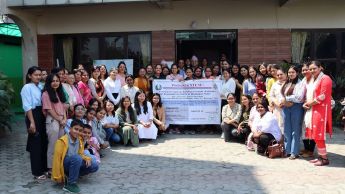A network for female researchers in Nepal
- 2023-05-03
- Ulrike Scheffer
- Comments

There are only a few women in Nepal who are working in STEM research. Dr Babita Paudel, herself a successful biologist, wants to change that. She has launched a network initiative to advance female researchers in her home country.
The invitation to a lecture opened Babita Paudel’s eyes. And forever changed her life. Up to that point, in early 2022, the biologist and Humboldt alumna had been mostly concerned with her own career. She returned to Nepal in 2013 after her PhD in South Korea and postdoctoral research in Germany. She then founded the Center for Natural and Applied Sciences (CENAS) in the capital city Kathmandu in 2017. Among other things, this biotech institute conducts research into unique microorganisms and plants from Nepal and investigates what medicinal benefits they might have
Only a few women conduct research within STEM subjects
Paudel is an exception in Nepal, since it’s only a few women there who conduct research within the natural sciences and technical disciplines. ‘I wasn’t even fully aware of that myself, I was just completely focussed on my research’, she says. But then the researcher was asked to give a lecture about women in Nepal working in the so-called STEM disciplines (science, technology, engineering, and mathematics). She began her research and the result was sobering: a UNESCO estimate suggests that only 7.8 per cent of researchers in STEM subjects in Nepal are women.
Yet women are in principle well represented at the country’s universities. They represent up to half of the students up to bachelor level. But only very few of them find their way into academia. ‘I had to do something about these figures. I decided to support women with their career in STEM subjects’, recounts Babita Paudel. She launched the initiative . She received an by the in 2022 in recognition of her commitment.
Advancement of women at different levels
The Nepalese government is also keen to encourage women’s involvement in academic work in STEM subjects. The initiative launched by Babita Paudel augments these efforts. She organises capacity-building training courses in various of the country’s provinces. The female participants learn about aspects including how to write project and funding applications. The initiative also grants its own small research budgets. She also ensures that young female Nepalese academics and researchers are invited to international conferences.
Science Heroes: Founder Head, CENAS| Humboldt Ambassador Scientist | Dr. Babita Paudel
Thi video introduces Dr. Babita Paudel, founder and Head at the Center for Natural and Applied Sciences, Kathmandu, Nepal. Her research area is the Natural Product Chemistry of medicinal plants and microorganisms.
Networks as the key to success
Babita Paudel sees the establishment of strong network structures as being particularly important. ‘Women often miss out on information on scholarships and job offers. We now share these details via social media.’ Her initiative’s Facebook group now has 1300 members. Field reports and success stories of early career female researchers are posted there. ‘These are inspiring stories that are intended to motivate other women to realise their dreams.’
Just as Babita Paudel has done. She was already passionate about biology as a schoolgirl and was subsequently determined to become a doctoral candidate. ‘That was always my big dream and I’m delighted that I can help other women to follow this path.’
